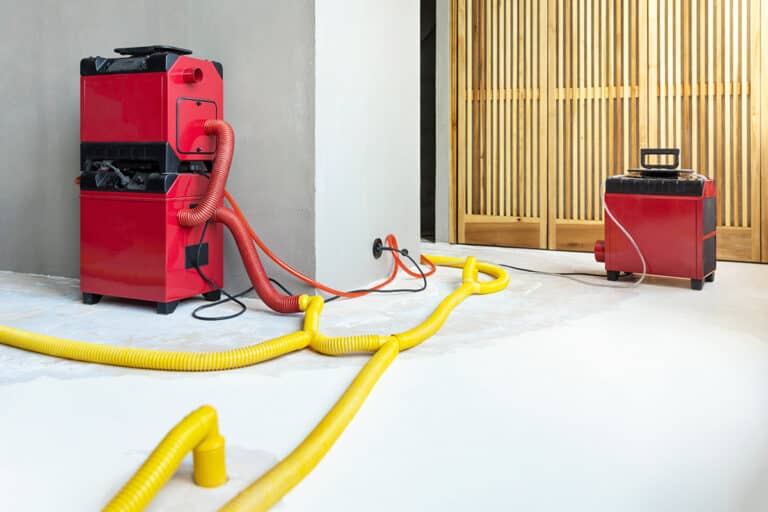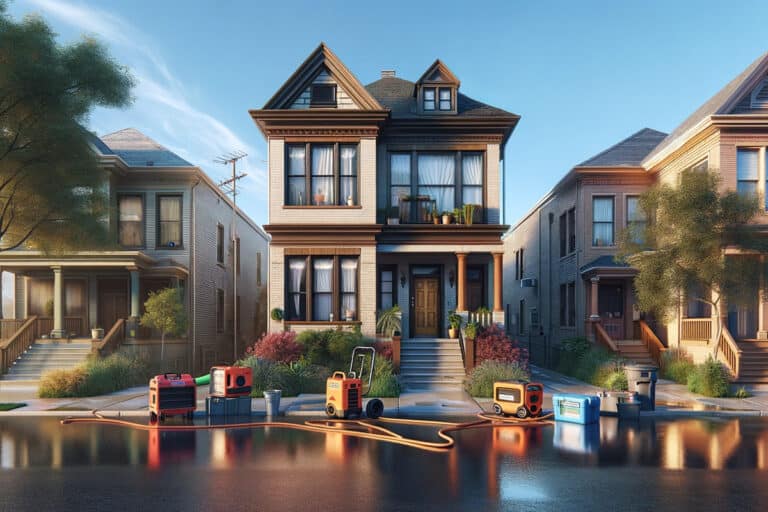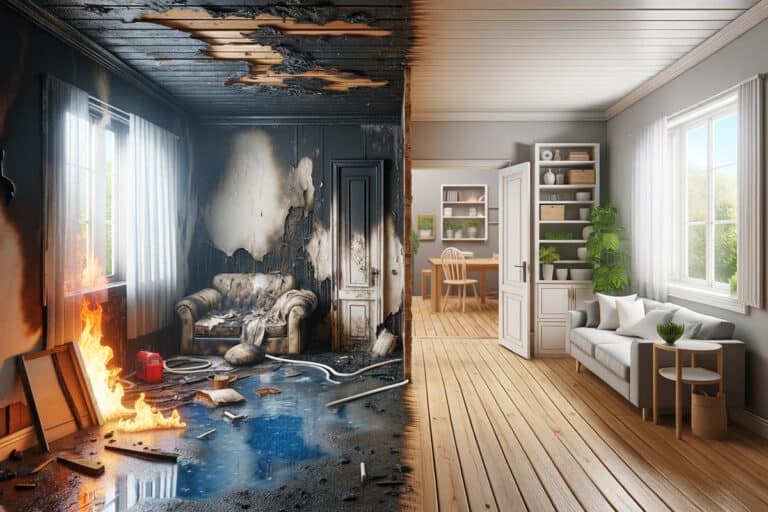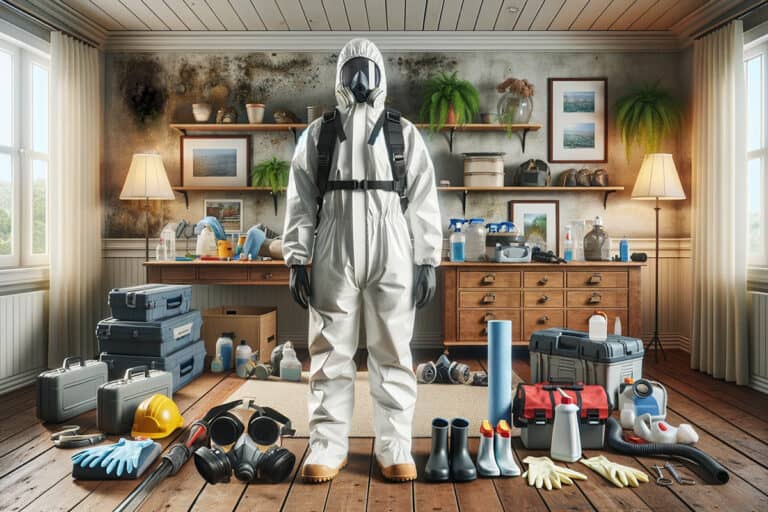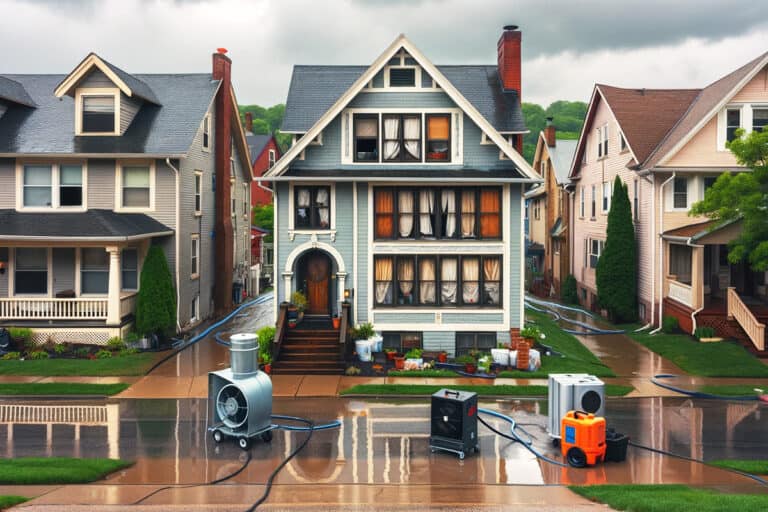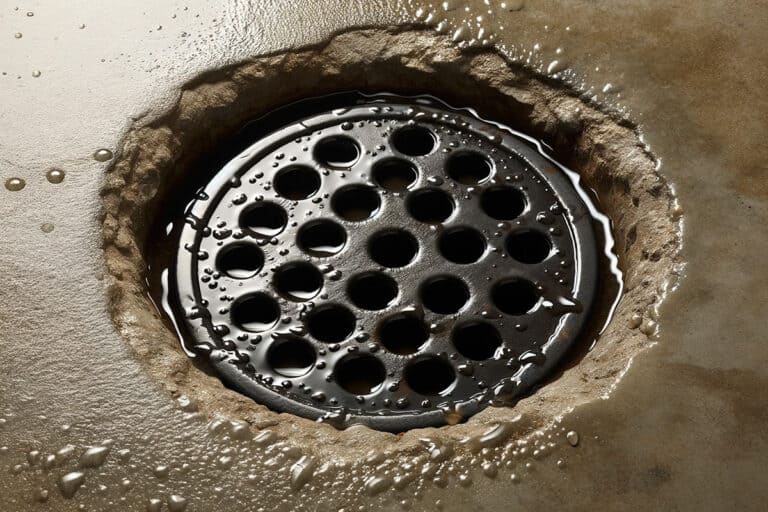Disclosure: I am compensated for purchases made through some links on this site. Click for details.
Water is essential for life, but it can also be destructive when it enters your property uninvited. Emergency water damage is a common problem that can happen anytime, anywhere, and for any reason. It can be caused by natural disasters such as floods or storms, or by man-made incidents such as burst pipes or leaking appliances.
Emergency water damage can have serious consequences for your property and your health. It can cause structural damage, electrical hazards, mold growth, bacterial contamination, and other problems that can affect your indoor air quality and your well-being.
That’s why you need to act fast when you discover emergency water damage in your property. The longer you wait, the worse the damage can get, and the more costly and time-consuming the recovery process can be.
But don’t worry. You don’t have to face this challenge alone. In this blog post, we will explain what emergency water damage is, what causes it, what are its effects, and how you can prevent it. We will also discuss the difference between mitigation, remediation, and restoration services and how they can help you recover from water damage.
What is Emergency Water Damage?
Emergency water damage is any sudden or unexpected intrusion of water into your property that requires immediate attention and action to prevent further damage and ensure safety. It can stem from:
- Natural Disasters: Natural disasters such as floods or storms are one of the most common causes of emergency water damage. They can happen suddenly and without warning due to heavy rainfalls, hurricanes, tornadoes, or other weather events.
- Plumbing Issues: Plumbing failures such as burst pipes or leaking appliances are another common cause of emergency water damage. They can happen due to various reasons such as corrosion, wear and tear, freezing temperatures, or human errors.
- Sewage Problems: Sewage backups or overflows are a serious type of emergency water damage that requires immediate attention. They can happen due to clogged pipes or septic systems that cannot handle the amount of wastewater produced by your property.
- Firefighting Efforts: Firefighting efforts that use water to extinguish flames can also cause emergency water damage. The water used to put out the fire can seep into your property’s structure and belongings and create additional problems.
- Human Errors: Human errors such as leaving the faucet running or forgetting to turn off the sprinkler system are another cause of emergency water damage. They may seem minor at first but can lead to significant damage if left unattended.
Emergency water damage can affect any part of your property such as:
- Basements
- Crawl spaces
- Attics
- Roofs
- Walls
- Floors
- Ceilings
It can also affect any type of property such as:
- Homes
- Apartments
- Condos
- Offices
- Warehouses
- Retail stores
Emergency water damage requires immediate attention because it can cause serious problems if left untreated. It can weaken the structure of your property, ruin your belongings, create health hazards, and lead to costly repairs.
Table: Causes and Effects of Emergency Water Damage
| Damage Cause | Potential Effects |
|---|---|
| Natural Disasters | Structural damage, flooding, mold growth |
| Plumbing Failures | Water leaks, structural damage, electrical hazards |
| Sewage Backups | Health hazards, unpleasant odors, property damage |
| Firefighting Efforts | Additional water damage, electrical issues |
| Human Errors | Water leaks, property damage, increased water bills |
What are the Effects of Emergency Water Damage?
Emergency water damage can have various effects on your property and your health such as:
Structural damage
Emergency water damage can weaken the structure of your property by rotting wood, rusting metal, or corroding concrete. It can also create cracks in walls or floors that compromise their integrity.
Electrical hazards
Emergency water damage can create electrical hazards by exposing wires or appliances to moisture. This can lead to short circuits or electrocution risks.
Mold and bacteria growth
Emergency water damage can create a favorable environment for mold and bacteria to grow. Mold and bacteria can spread quickly and cause health problems such as allergies, infections, or respiratory issues. They can also damage your property and belongings by staining, discoloring, or deteriorating them.
Loss of value and appeal
Emergency water damage can reduce the value and appeal of your property by causing visible damage, unpleasant odors, or unsightly stains. It can also lower your property’s marketability and attractiveness to potential buyers or tenants.
How to Prevent Emergency Water Damage
Emergency water damage can be prevented by taking some simple steps such as:
- Regularly inspect your property for signs of water leaks or damage.
- Maintain plumbing systems and appliances.
- Instal water sensors or alarms that can alert you of any water intrusion
- Clean your gutters and downspouts to prevent water accumulation from your roof
- Seal any cracks or gaps in your walls, floors, or foundation
- Landscape and grade your yard to direct water away from your property
- Create an emergency plan and have contact information for a professional water damage restoration company at hand.
By following these tips, you can reduce the risk of emergency water damage and protect your property and health.
Table: Prevention Tips for Emergency Water Damage
| Prevention Tip | How It Helps |
|---|---|
| Regular Inspections | Early detection of potential issues |
| Proper Maintenance of Plumbing and Appliances | Prevents leaks and failures |
| Installation of Water Sensors or Alarms | Provides immediate alerts of water intrusion |
| Clean Gutters and Downspouts | Prevents water accumulation and damage |
| Sealing Cracks and Gaps | Keeps water out of vulnerable areas |
| Landsacping and Yard Grading | Directs water away from your property |
| Creating an Emergency Plan | Ensures quick and efficient response to water damage |
Understanding Mitigation, Remediation, and Restoration: What’s the Difference?
When you experience emergency water damage, you may hear different terms such as mitigation, remediation, and restoration. These are different types of services that can help you recover from water damage. Here is what they mean:
Mitigation
Mitigation is the process of stopping or minimizing the damage caused by water intrusion. It involves removing any standing water or excess moisture from your property as quickly as possible, using specialized equipment and techniques.
The goal of mitigation is to prevent further damage to your property and belongings, as well as to minimize the risk of mold and bacteria growth.
Mitigation is a time-sensitive process that requires professional expertise and equipment. It should be done as soon as possible after a water emergency.
Remediation
Remediation is the process of eliminating or reducing the harmful effects of water damage. It involves cleaning and disinfecting the affected areas using antimicrobial agents, as well as removing any damaged or contaminated materials that cannot be salvaged.
The goal of remediation is to make your property safe, healthy, and hygienic again, as well as to prevent any future problems.
Remediation is a thorough and customized process that requires professional skills and equipment. It should be done after the mitigation process is complete.
Restoration
Restoration is the process of repairing or restoring any damage caused by water intrusion. It involves replacing or repairing any damaged materials such as drywall, flooring, cabinets, furniture, etc., as well as restoring any electrical or plumbing systems that were affected by the water.
The goal of restoration is to make your property comfortable, functional, and beautiful again, as well as to restore its value and appearance.
Restoration is a complex and personalized process that requires professional skills and equipment. It should be done after the remediation process is complete.
Table: Water Damage Services Comparison
| Service | Purpose | When It’s Needed |
|---|---|---|
| Mitigation | To stop or minimize further damage | Immediately after water damage occurs |
| Remediation | To clean, disinfect, and ensure a safe environment | After mitigation, before restoration |
| Restoration | To repair or replace damaged items and structures | After remediation, to return property to pre-damage condition |
How Can You Choose the Right Service for Your Emergency Water Damage?
Choosing the right service for your emergency water damage depends on several factors such as:
- The type and category of water that caused the damage
- The extent and severity of the damage
- The type and condition of the materials that were affected
- The availability and cost of the service providers
- The insurance coverage and claim process
Here are some tips to help you choose the right service for your emergency water damage:
- Assess the situation and determine the type and category of water that caused the damage. If you are dealing with black water or sewage backup, you need to contact a professional company that specializes in this type of service.
- Contact your insurance company and find out what kind of coverage you have for water damage. Ask them if they have any preferred service providers or if you can choose your own. Also ask them about the claim process and what documents you need to provide.
- Compare different service providers based on their reputation, experience, certification, equipment, availability, response time, warranty, and price. Ask for references and reviews from previous customers. Check their credentials and licenses with local authorities.
- Choose a service provider that offers a free estimate, a detailed contract, a 24/7 emergency response, a 100% satisfaction guarantee, and a one-year warranty on their work.
- Follow up with the service provider throughout the process and make sure they communicate with you regularly. Ask them any questions or concerns you have along the way. Give them feedback on their work quality and customer service.
Table: Choosing a Water Damage Restoration Company
| Factor | Why It’s Important | What to Look For |
|---|---|---|
| Reputation | Ensures reliability and quality of service | Positive reviews, recommendations |
| Experience and Certification | Ensures the company has necessary skills | Years in business, industry certifications |
| Equipment and Techniques | Ensures efficiency and effectiveness | Modern, industry-standard equipment |
| Availability and Response Time | Ensures timely intervention | 24/7 availability, quick response times |
| Warranty and Satisfaction Guarantee | Ensures accountability and quality of work | Clear warranty terms, satisfaction guarantee |
FAQs About Emergency Water Damage
Conclusion: You’re Not Alone in This
Emergency water damage can be a nightmare for any property owner. But you don’t have to face it alone. In this blog post, we have explained what emergency water damage is, what causes it, what are its effects, and how you can prevent it. We have also discussed the difference between mitigation, remediation, and restoration services and how they can help you recover from water damage.
We hope this information has been helpful and informative for you. If you have any questions or concerns about emergency water damage, or if you need our help with a water emergency, don’t hesitate to contact us today. We are here to help you.

